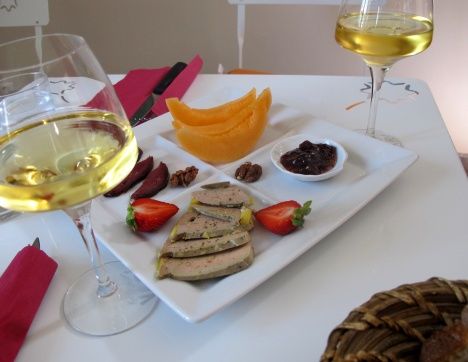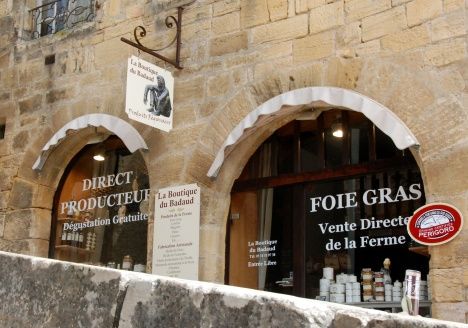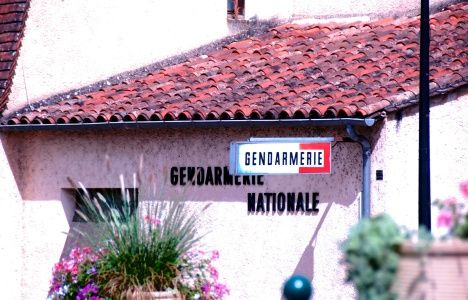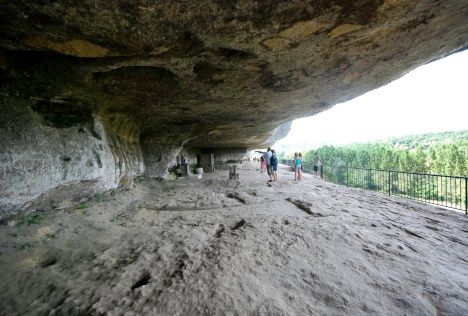It's Bruno, the chief of police, who lures me to the Périgord. To Saint-Denis, a rural community on the Vézère with just under 3,000 inhabitants, shortly before the river flows into the much larger Dordogne. Here lives Bruno Courrèges, a rural police officer, directly subordinate to the mayor, responsible for the peaceful coexistence in the village: traffic regulation, controls on the market, organization of commemorative ceremonies and other mostly patriotic occasions; he watches over the observance of the park regulations, sometimes fights a small fire, brings back lost dogs and registers births and deaths. In short: Bruno is a person of respect, but at the same time a real "friend and helper".

|
| Delicious snack in the Périgord (Photo: P. Züllig) |
But Bruno is also a bon vivant, a gourmet, an amateur cook, a good-looking man, a former rugby player who now coaches the youth of Saint-Denis. Even the brigadier - who has come to Saint-Denis for work - says: "You have no idea how good you have it here in Saint-Denis. Delicious food, two bistros worthy of the name, and wine from our own valley. Half my staff in Périgueux live on fast food." And another time he said, "Prepare yourself for a treat..." as Bruno took his Laguiole knife from his belt, unfolded the corkscrew, and opened the gleaming golden Monbazillac. "Bon appétit and welcome to the culinary heartland of France," he said, spreading the bread paper-thin with the yellow layer of fat that sealed the liver pieces, then topping it with a generous slice of pâté. Bruno grinned as the brigadier sniffed his Monbazillac and said, "The spring sun warms the wall of the old château, and we enjoy foie gras with a perfect drop."

|
| Seduction or temptation - regional products (Photo: P. Züllig) |
Wouldn't you go there, to the culinary heart of France? Even if you reject foie gras for animal welfare reasons and don't want to meet the "poor" geese of the Périgord. There is, after all, the wine, the sweet Monbazillac or the red, dry Pécharmant, cheese, pâté and, of course, the black truffle.
Only - Saint-Denis in the Périgord doesn't exist and Bruno Courrèges, the perfect policeman and epicurean, doesn't exist either. At least, that's not his name. The Scotsman Martin Walker - journalist and chairman of a private think-tank for top executives - has brought them to life in his four Bruno novels to date. "Sometimes I feel guilty when I think about moving my Bruno stories, with their fictional murders and serious crimes, to the peaceful French valleys of the Vézère and the Dordogne, where life is so pleasant and crime is the absolute exception," writes the author, who has lived at least partly in the Périgord for many years.
Even if Saint-Denis doesn't exist, it does, with all the characters, the scenic beauty, the culinary delights, the idiosyncrasies of the inhabitants and the historical references as described in the crime novels. Often I have the impression that the fictional Saint-Denis is more real, closer to reality than the place (or places) which was (or were) the model for it. So I really saw the town hall, as well as the municipal campsite, the wine shop, the old château where the showdown in "Delicacies" takes place, and even the gendarmerie, where the not very popular inspector is in charge of the national police station.

|
| A piece of Bruno's world in fictional Saint-Denis (Photo: P. Züllig) |
The two worlds - the (almost) fictional one of Martin Walker and the real one in many a village in the Périgord - slide into each other, mix, lead me to experience the area of the Dordogne, the Vézère and the Lot much more intensively than what one can otherwise experience as a tourist in a region. Crime novels become excellent guides to a French province that has always been (and still is) somewhat in the "shadow" of the wine city and wine region of Bordeaux. Wrongly, I think, because the Périgord has more to offer than "just" world-famous wine, namely the desire to live and enjoy, in short, a rich palette of sensuality.
This starts with important historical witnesses: the cave of Lascaux with the most beautiful rock paintings I have ever seen (dating from 17,000 to 15,000 B.C., maybe even earlier); the rock city of La Roque St. Christophe, at 80 metres above sea level, more than a kilometre long, built on a rocky ledge in the 10th century to protect it from the Vikings. The former trading town of Sarlat, with its beautifully renovated medieval, Renaissance and Baroque buildings; the wine route around Bergerac; a wine region that has (re)found its independence.

|
| Rock town of La Roque St. Christophe (Photo: P. Züllig) |
There is a danger that this column will degenerate into a tourist travelogue, that the visual impressions and the pilgrimage sites of the tourists (for example Bergerac with its almost even more famous Cyrano, who - apart from the name - has nothing to do with Bergerac) will not be the main focus of this column.he name) gain the upper hand and the "real" Périgord with its truffles, its foie gras (elevated to a French cultural asset), its cheeses and, of course, its wines become a minor matter. Martin Walker saves me there, with his four Périgord books. I'll let him tell it, and then I'll report on the region's wine route and wines in the next column.
Here - as an appetizer, as it were - is a slightly abridged recipe from "Delikatessen" (Diogenes Verlag, Zurich, 2012): "Bruno put the slices of liver into the melting honey, which was so hot that the pores closed immediately. The fat oozed out, but the meat itself remained juicy... The foie gras succeeds best with thirty seconds per side... he took the pan from the heat and poured the oozing fat into a container provided... from a bottle he now poured several spoonfuls of balsamic vinegar into the pan and mixed the drippings with it. Adding three large tablespoons of honey, a sauce developed that amazed Carlos... Bruno now took out the toasted bread from under the grill, quickly rubbed a clove of garlic over the slices and distributed them on the preheated plates. With each came two slices of fried liver, drizzled with honey and vinegar gravy. Finally, he took an already opened bottle of Monbazillac out of the fridge... You must drink this with liver, he said, pouring the heavy, golden Bergerac wine... Bon appétit."
Sincerely
Yours